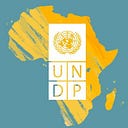Cash for Work in the Central African Republic
Multiple crises have shaken the Central African Republic since 2013, disrupting the country’s economy and harming relations between communities. Noëlla, a 29 years-old mother of four, used to be among the more than 640,000 internally displaced people (IDPs) still reported throughout the country.
— — — — — — — — -
When the conflict started …we fled to my husband’s hometown near the border of Cameroon as Internally Displaced Persons. I returned to Berberati with my children in 2017 but my husband decided to stay in his hometown. So, we no longer live together.
— — — — — — — — — -
Now a single head of household, Noëlla was selected as a beneficiary for the cash-for-work and recovery programme launched by the Government with UNDP support and financing from Japan. The initiative aims to meet urgent humanitarian and development needs through the reintegration of IDPs and returnees into local communities.
One thousand vulnerable persons (500 women and 500 men, including 100 disabled persons) were selected from 7 districts in Berberati as beneficiaries. They also participated in workshops on social cohesion to learn how to cohabitate with other ethnic and religious groups.
Noëlla worked during 45 days on two infrastructure projects vetted by a community-elected committee: a 17-km road and a youth and cultural centre. She received 2,500 FCFA (4.5 USD) per day and an additional 1,000 FCFA to be saved for the launch of income generating activities. This enabled her to earn enough money to feed her children and pay for their school expenses.
During the Cash for Work Programme, Noëlla also participated in social cohesion workshops to learn how to manage conflicts within communities and cohabitate with other ethnic and religious groups. Shortly after leaving the programme, Noëlla partnered with some of her fellow workers to start a soap-making business named “ELE SONGO” (Be a family).
The association counts 28 members, 17 women and 11 men, who elected Noëlla as president.
It was the first time in my life [I got to] to undertake an important function. I see myself [as] more responsible now and I am very happy for the fact that my colleagues have confidence in me.
Thanks to the savings constituted by members during the Cash for Work Programme and a start-up grant from the project, the group bought material, wheelbarrows and other necessary tools. They also got support from the project to register their association and prepare a business plan.
Being a member of Cash for Work and [starting] the association changed my life, Noëlla says. Recently, I was able to pay the medical expenses for my son when he got malaria, without [having to] ask for help.
“ELE SONGO” already produced more than 1,200 soaps and earned 124 000 FCFA (216 USD) in 2 months. The members expect to produce more and start creating benefits that will be distributed among them.
Text and photos: UNDP Central African Republic
